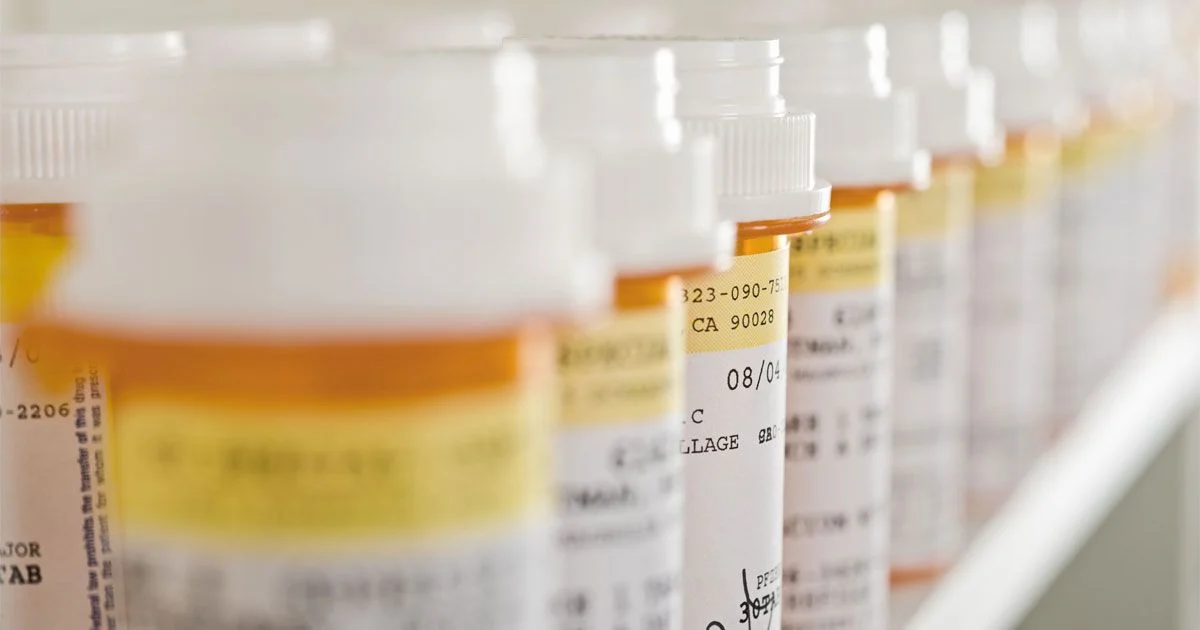Doxepin is a tricyclic antidepressant, which works by stimulating the production of natural chemicals (neurotransmitters) in the brain. Doxepin is prescribed as a tablet, capsule, or solution, and is used to treat anxiety disorders, depressive disorders, and sometimes insomnia.[1] Never take doxepin without proper medical advice as it can cause severe adverse effects.

What are the brand names of doxepin?
- Silenor Capsules
- SINEquan concentrated solution
What is it doxepin prescribed for?
Doxepin is a drug used to treat patients with depression, and anxiety. If the drug is successful, it can promote feelings of balance and well-being and may help you get a better night’s sleep, it can also help increase your energy levels.[2]
How does doxepin work?
Doxepin works in tandem with the central nervous system to increase higher production levels of neurotransmitters in the brain. Neurotransmitters are chemicals your brain already makes by itself, however making more of some of these chemicals can facilitate neurochemical balance.[2] It is not certain, but doxepin may also inhibit your brain from reabsorbing the chemical norepinephrine. Keeping more norepinephrine available in your body can improve your mood.[3]
How is it taken?
Doxepin is taken orally, by tablet, capsule, or as an oral concentrate, using the dosage prescribed by your doctor. When used for the treatment of insomnia, it is usually taken once per day, half an hour before bed. Doxepin should not be taken within 3 hours of a meal.[4]
When it is used in the treatment of depression or anxiety, doxepin will usually be taken one to three times a day, with or without food. The time at which it should be taken each day should be consistent, day to day.
To reduce the risks of adverse reactions, your doctor may direct you to begin with a lower initial dose. If you are shown to be tolerating the drug, your dosage will be gradually increased.
You should take doxepin only as directed. If you miss a dose, skip it, and never double a dose to keep up. Take your next dose at the regular time.[2]
How long does doxepin stay in your system?
The amount of time doxepin stays in your system can vary.
With a half-life of anywhere between 8 and 25 hours, doxepin could stay in your system for anytime between 2 and 5.5 days. A testable level of doxepin can remain present in your urine for up to 7 days. Traces of doxepin can be detected in blood plasma for up to 14 days. Due to the potential reactivity of the drug when combined with other medications, it is advised that patients using doxepin wait two weeks before commencing use of other medicines which could interact negatively with doxepin. [6]
Doxepin side effects
As with all medications, doxepin can have a range of mild to severe side effects. Most side effects will go away on their own, however if side effects become worse with time or do not subside, contact your doctor.
Common but less severe side effects include:
- Dizziness
- Drowsiness
- Blurry vision
- Dry mouth
- Constipation
- Trouble urinating
- Nausea
More severe side effects include:
- Heartburn or chest pain that does not go away
- Mood changes such as anxiety, agitation, confusion
- Muscle spasms or twitching
- Severe abdominal pain
Severe side effects that need immediate medical attention include:
- Severe dizziness
- Rapid or irregular heartbeat
- High blood pressure
- Fainting
- Seizures
- Eye pain/swelling/redness
- Dilated pupils or changes in vision
- Pins and needles
- Skin rash, itching or swelling
- Unusual bleeding or bruising
- Trouble breathing
Be aware, this is not a complete list. A complete list should be obtained from your doctor/pharmacist.
Doxepin precautions
It is extremely important to consider your medical history and your family’s medical history before taking doxepin.
If you suffer from any of the below, speak to your doctor, pharmacist, or medical professional.
- If you have had an allergic reaction to any tricyclic antidepressant medications (If you have allergies, you should discuss them with your doctor)
- Personal history of suicidal thoughts/attempts or family history of suicide
- Personal or family history of bipolar disorder or other psychiatric disorders
- Personal or family history of seizures
- Any conditions which may increase your risk of seizure (brain disease/ alcohol/ sedative withdrawal)
- Breathing problems
- Bleeding problems
- Brain disease
- Personal or family history of glaucoma
- Liver problems
- Recent heart attack
- Overactive thyroid
- Urinary retention or enlarged prostate
If you have a heart condition, it is very important to discuss this with your doctor.
Doxepin has a black box warning, which is the most serious warning from the Food and Drug Administration (FDA). This is because doxepin may increase suicidal thoughts or actions in some children, teenagers, or young adults. Whilst this is rare, suicidal thoughts or actions are more likely to occur during the first few months of treatment or during dosage adjustments. If you experience any suicidal thoughts or thoughts of harming yourself, call your doctor right away.
History of heart conditions
Tell your doctor if there is a history of any heart conditions in your family, as rarely, doxepin can trigger a heart condition called QT prolongation, which disrupts the hearts rhythm. It can also be experienced as severe dizziness and fainting.
Whilst this condition is rarely fatal, it is serious, and should be treated immediately. QT prolongation is more likely to occur when other medications that increase its risk are also being taken, therefore it is very important to discuss other medications with your doctor before taking doxepin.
QT prolongation is also more likely to occur in those who take doxepin and:
- Suffer with chronic diarrhea, vomiting and excessive sweating
- Regularly use diuretics or water pills
- Have lower amounts of potassium and magnesium in the blood
Speak to your doctor about how to use Doxepin safely if these conditions affect you.
If you have diabetes
For those who have diabetes, taking doxepin can make it more difficult to maintain your blood sugar levels. If taking doxepin, you should monitor your blood sugar levels more regularly and share the results with your doctor or medical professional. Changes to your medication and lifestyle, such as diet or exercise may be necessary for those who have diabetes and begin to take doxepin.
Doxepin interactions
Doxepin can interact with other medications, vitamins, and even complimentary medicines such as herbal remedies. These drug interactions may be harmful or prevent the drug from working as well as it should. Your doctor should review all the medicines you take, including those prescribed and any herbal remedies or supplements.[7]
Antidepressants
It is dangerous for anyone to take doxepin with any monoamine oxidase inhibitors (MAOIs), and the interaction can be fatal. Doxepin should not be taken if you are currently taking MAOIs or have taken them with 14 days before taking doxepin.
The most prescribed MAOIs include:
- Isocarboxazid
- Selegiline
- Phenelzine
- Tranylcypromine
Taking other drugs for anxiety or depression can also interact with the way your body processes doxepin.
Specifically, these medications include:
- Bupropion
- Duloxetine
- Fluoxetine
- Paroxetine
- Sertraline
Medications for Type 2 Diabetes
It can be dangerous to take tolazamide with doxepin as the interaction can lead to extremely low blood sugar levels for type 2 diabetics.
Antifungal drugs
Taking doxepin while also taking drugs to relieve fungal infections can lead to dangerously high amounts of doxepin in the body.
These include:
- Fluconazole
- Terbinafine
- Voriconazole
Heart rhythm drugs
Taking drugs used to treat heart rhythm problems whilst also taking doxepin can increase the risk of heart rhythm problems.
These include:
- Dronedarone
- Quinidine
Kidney disease drugs
One of the medications used for kidney disease is cinacalcet, which can slow down the rate at which doxepin is metabolized in the body and accentuate the risk of side effects.
Gastrointestinal drugs
One of the medications used for digestive issues is cimetidine, which can slow down the rate at which doxepin is metabolized in the body and accentuate the risk of side effects.
Doxepin can enhance the effects of other drugs, alcohol, and any drug that acts as a depressant on the central nervous system.
These include (but are not limited to):
- hay fever and allergy medications
- Over the counter cold, flu and cough treatments and decongestants
- Any medication that can cause sedative effects, including opioid pain medications, tranquilizers sedatives, barbiturates and muscle relaxants, and anesthetics
- Anti-convulsant and medication for seizures
Doxepin storage
Keep out of sight and reach of children and pets. Store at room temperature, ideally not in the bathroom as doxepin should be kept away from moisture.
What to do if you overdose
Symptoms of overdose can include:
- Trouble breathing
- Hallucinations
- Increased pupil size
- Severe drowsiness
- Seizures
- Fainting
- Respiratory depression
- Increased heart rate
- A weak pulse
If you or someone close to you has overdosed, call emergency services immediately.
Doxepin warnings
Suicidal tendencies
Doxepin has a black box warning, which is the most serious warning from the Food and Drug Administration (FDA). This is because doxepin may increase suicidal thoughts or actions in some children, teenagers, or young adults. Whilst this is rare, suicidal thoughts or actions are more likely to occur during the first few months of treatment or during dose adjustments. If you experience any suicidal ideation or thoughts of harming yourself, call your doctor right away.
Pregnancy and breastfeeding
This drug should not be used during pregnancy unless the potential positives for the mother outweigh the potential risk to the child. There is a small risk of children born to mothers who have used doxepin in the last 3 months of pregnancy experiencing withdrawal symptoms such as breathing/feeding problems, muscle stiffness, constant crying, and seizures. If these symptoms are apparent in your newborn, speak to your doctor immediately.[9] Additionally, if doxepin is taken whilst breastfeeding, there is a risk that traces of the drug will pass into the milk, therefore increasing the chances of breathing problems in the child, amongst other risks. Breastfeeding whilst using this medication is not recommended, and so you are advised to speak to your doctor regarding alternative options. [10]
Alcohol and drug use
Drowsiness is one of the most pronounced and common side effects of doxepin, therefore people who drink or smoke marijuana should speak with their doctor about potential risk.
Driving
Those who drive should refrain from doing so until they are sure they know how doxepin affects them, as this drug can take 2-3 weeks to take full effect. Doxepin can cause drowsiness and so you should not operate heavy machinery whilst taking it,
Glaucoma
If you have Glaucoma, you should not take doxepin as it will make your condition worse.
Bladder issues
If you have trouble urinating, you should not take Doxepin as it will make your condition worse.
Children
Doxepin has not been established as safe for use in children younger than 12 years of age and should not be prescribed for pediatric patients under that age bracket.
Seniors
Elderly patients may be more sensitive to the effects of doxepin, and therefore may feel more confused, drowsy, experience more headaches and be at an increased risk of falls.
Fertility
If you are trying to conceive or wish to in the future, you should notify your doctor of this, as it is still unclear as to how doxepin may affect fertility.
Dementia
Clinical studies have shown that those who use doxepin have an increased chance of suffering from Dementia later in life.
Erectile dysfunction
Doxepin may also cause problems with achieving and sustaining an erection.
Frequently asked questions about doxepin
Is Doxepin addictive?
Doxepin has been shown to have a minimal addictive effect, however stopping your medication abruptly can trigger withdrawal symptoms such as nausea, headache, sleep disturbance, and generalized tiredness. To avoid these symptoms, you should work with your doctor to reduce your daily dose gradually before stopping doxepin completely.
What is the difference between Doxepin and Amitriptyline?
Both doxepin and amitriptyline are part of a group of drugs used to treat depression and anxiety. However, whilst doxepin is used solely to treat depression, anxiety, and sometimes insomnia, amitriptyline uses are more varied. For example, it could be used in cases requiring pain management, i.e., for the treatment of postherpetic neuralgia and to prevent and treat migraines.
- Doxepin (Depression, Anxiety): MedlinePlus Drug Information. (n.d.). Retrieved November 2, 2022, from https://medlineplus.gov/druginfo/meds/a682390.html
- Almasi, A., & Meza, C. E. (2023). Doxepin. PubMed; StatPearls Publishing. https://www.ncbi.nlm.nih.gov/books/NBK542306/#:~:text=Doxepin
- Almasi, A., & Meza, C. E. (2023). Doxepin. PubMed; StatPearls Publishing. https://www.ncbi.nlm.nih.gov/books/NBK542306/#:~:text=Doxepin
- DailyMed – DOXEPIN HYDROCHLORIDE capsule. (n.d.). Dailymed.nlm.nih.gov. Retrieved November 25, 2022, from https://dailymed.nlm.nih.gov/dailymed/drugInfo.cfm?setid=71cff7cd-0410-4194-9cdd-af404a869edd
- Doxepin (Depression, Anxiety): MedlinePlus Drug Information. (n.d.-b). Retrieved November 2, 2022, from https://medlineplus.gov/druginfo/meds/a682390.html
- Almasi, A., & Meza, C. E. (2023). Doxepin. PubMed; StatPearls Publishing. https://www.ncbi.nlm.nih.gov/books/NBK542306/#:~:text=Doxepin
- Doxepin 25mg Capsules – Summary of Product Characteristics (SmPC) – (emc). (n.d.). Www.medicines.org.uk. Retrieved November 25, 2022, from https://www.medicines.org.uk/emc/product/12568/smpc#gref
- DailyMed – DOXEPIN HYDROCHLORIDE capsule. (n.d.). Dailymed.nlm.nih.gov. Retrieved November 25, 2022, from https://dailymed.nlm.nih.gov/dailymed/drugInfo.cfm?setid=71cff7cd-0410-4194-9cdd-af404a869edd
- Almasi, A., & Meza, C. E. (2023). Doxepin. PubMed; StatPearls Publishing. https://www.ncbi.nlm.nih.gov/books/NBK542306/#:~:text=Doxepin
The Clinical Affairs Team at MentalHealth.com is a dedicated group of medical professionals with diverse and extensive clinical experience. They actively contribute to the development of content, products, and services, and meticulously review all medical material before publication to ensure accuracy and alignment with current research and conversations in mental health. For more information, please visit the Editorial Policy.
MentalHealth.com is a health technology company guiding people towards self-understanding and connection. The platform provides reliable resources, accessible services, and nurturing communities. Its purpose is to educate, support, and empower people in their pursuit of well-being.
Nadia Whiston is a medical writer with a Master of Arts (MA) degree in English Literature from the University of Bristol and a Bachelor of Arts (BA Hons) degree in English Literature from The University of Manchester.
Talyer Hackett is a medical writer and researcher with 10+ years of experience, holding B.A. in Psychology from the University of Liverpool.
The Clinical Affairs Team at MentalHealth.com is a dedicated group of medical professionals with diverse and extensive clinical experience. They actively contribute to the development of content, products, and services, and meticulously review all medical material before publication to ensure accuracy and alignment with current research and conversations in mental health. For more information, please visit the Editorial Policy.
MentalHealth.com is a health technology company guiding people towards self-understanding and connection. The platform provides reliable resources, accessible services, and nurturing communities. Its purpose is to educate, support, and empower people in their pursuit of well-being.

